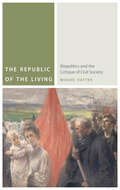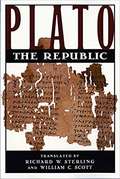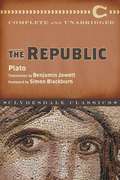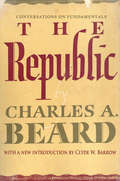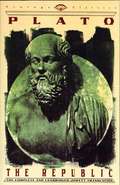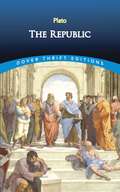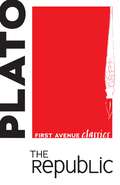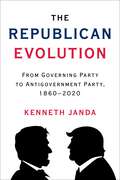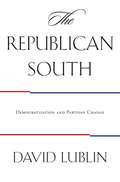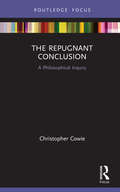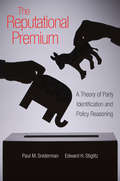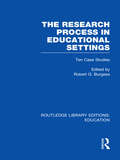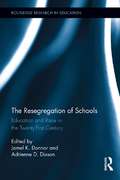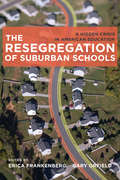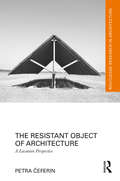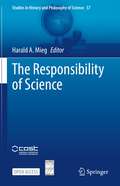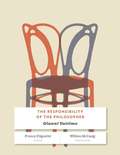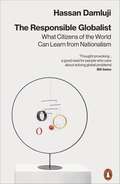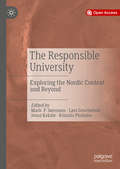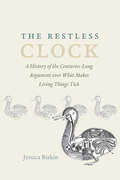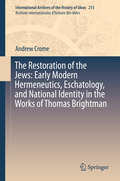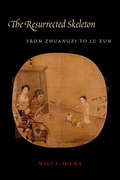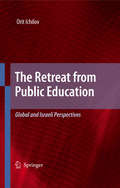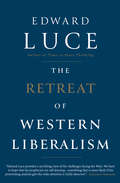- Table View
- List View
The Republic of the Living: Biopolitics and the Critique of Civil Society (Commonalities)
by Miguel VatterThis book takes up Foucault’s hypothesis that liberal “civil society,” far from being a sphere of natural freedoms, designates the social spaces where our biological lives come under new forms of control and are invested with new forms of biopower. In order to test this hypothesis, its chapters examine the critical theory of civil society—from Hegel and Marx through Lukacs, Adorno, Benjamin, and Arendt—from the new horizon opened up by Foucault’s turn to biopolitics and its reception in recent Italian theory.Negri, Agamben, and Esposito have argued that biopolitics not only denotes new forms of domination over life but harbors within it an affirmative relation between biological life and politics that carries an emancipatory potential. The chapters of this book take up this suggestion by locating this emancipatory potential in thebiopolitical feature of the human condition that Arendt called “natality.” The book proceeds to illustrate how natality is the basis for a republican articulation of an affirmative biopolitics. It aims to renew the critical theory of civil society by pursuing the traces of natality as a “surplus of life” that resists the oppressive government oflife found in the capitalist political economy, in the liberal system of rights, and in the bourgeois family.By contrast, natality offers the normative foundation for a new “republic of the living.” Finally, natality permits us to establish a relation between biological life and contemplative life that reverses the long-held belief in a privileged relationship of thinking to the possibility of our death. The result is a materialist, atheologicalconception of contemplative life as eternal life.
The Republic: A New Translation
by Plato"This new version of Plato's Republic by Sterling and Scott is founded on a sensitively accurate and highly readable fusion of form and content, style, and substance. Plato emerges, as he should, as both thinker and philosophical poet-something that cannot be said of competing versions. --William Arrowsmith, Emory University <P><P> William C. Scott is Humanities Research Professor at Dartmouth College. Richard W. Sterling is Professor of Government Emeritus at Dartmouth College.
The Republic: Book Vii (Books That Changed The World Ser. #4)
by Plato Simon BlackburnPackaged in handsome, affordable trade editions, Clydesdale Classics is a new series of essential works. From the musings of intellectuals such as Thomas Paine in Common Sense to the striking personal narrative of Harriet Jacobs in Incidents in the Life of a Slave Girl, this new series is a comprehensive collection of our intellectual history through the words of the exceptional few.Originating in approximately 380 BC, Republic is a Socratic dialogue written by famed Greek philosopher Plato. Often referred to as Plato’s masterwork, Republic’s central goal is to define the ideal state. By conceptualizing this model state, Greeks believed it would lead states formed with its principles in mind to function the most efficiently and fairly, striving toward justice and the greater good of society.This edition includes a foreword by British American philosopher and Plato expert Simon Blackburn. Widely read around the world by philosophy students and academics alike, Plato’s Republic is sure to pass on its invaluable lessons and enlighten the next generation of thinkers.
The Republic: Conversations on Fundamentals
by Charles A. Beard Clyde W. BarrowIn more than 230 years of statehood, the United States has created its own distinctive way of living and governing--a way which its citizens cherish, but about whose essence, for want of definition, they frequently disagree. Charles Beard offered, in a synthesis of his life work, a permanent statement on the nature of the American Republic. To carry out his purpose, Beard discusses, among other subjects, the making of one nation out of many peoples and nationalities, the letter and the spirit of the Constitution, the rights and liberties of citizens, the theory of checks and balances, the role of political parties, the Republic in the world of nations, and the coming fate and fortune of America. Above all, he deals philosophically with the eternal conflict between power and freedom, security and liberty. In form, the book is a series of conversations among friends. The author and two public-spirited citizens carry the main burden of the discourse, and other figures are introduced to present special but prevailing points of view. In this way the reader not only feels that he is participating in a search for the truth, but discovers that his own point of view has here an able sponsor. Beard has taken a theme of majestic scope and presented it in terms that are warm and human and immediately relevant.
The Republic: The Complete and Unabridged Jowett Translation (Vintage Classics)
by Plato(Book Jacket Status: Jacketed)Toward the end of the astonishing period of Athenian creativity that furnished Western civilization with the greater part of its intellectual, artistic, and political wealth, Plato wrote The Republic, his discussion of the nature and meaning of justice and of the ideal state and its ruler. All subsequent European thinking about these subjects owes its character, directly or indirectly, to this most famous (and most accessible) of the Platonic dialogues. Although he describes a society that looks to some like the ideal human community and to others like a totalitarian nightmare, in the course of his description Plato raises enduringly relevant questions about politics, art, education, and the general conduct of life.Translated by A. D. Lindsay
The Republic: The Statesman Of Plato (Dover Thrift Editions Ser.)
by PlatoOften ranked as the greatest of Plato's many remarkable writings, this celebrated philosophical work of the fourth century B.C. contemplates the elements of an ideal state, serving as the forerunner for such other classics of political thought as Cicero's De Republica, St. Augustine's City of God, and Thomas More's Utopia.Written in the form of a dialog in which Socrates questions his students and fellow citizens, The Republic concerns itself chiefly with the question, "What is justice?" as well as Plato's theory of ideas and his conception of the philosopher's role in society. To explore the latter, he invents the allegory of the cave to illustrate his notion that ordinary men are like prisoners in a cave, observing only the shadows of things, while philosophers are those who venture outside the cave and see things as they really are, and whose task it is to return to the cave and tell the truth about what they have seen. This dynamic metaphor expresses at once the eternal conflict between the world of the senses (the cave) and the world of ideas (the world outside the cave), and the philosopher's role as mediator between the two.High school and college students, as well as lovers of classical literature and philosophy, will welcome this handsome and inexpensive edition of an immortal work. It appears here in the fine translation by the English classicist Benjamin Jowett.
The Republic: The Statesman Of Plato (First Avenue Classics ™)
by PlatoWhat is justice? And what is its relation to happiness? These two questions form the central themes of this philosophic text, written by the Greek philosopher Plato around 380 BCE. It is framed as a Socratic dialogue—a conversation and argument led by Plato's teacher Socrates. In his attempt to define the concept of both societal and individual justice, Plato covers ethics, political philosophy, and even epistemology and metaphysics. This is an unabridged version of the English translation by Benjamin Jowett, published in 1908.
The Republican Evolution: From Governing Party to Antigovernment Party, 1860–2020
by Kenneth JandaThe Republican Party was founded in 1854 to oppose slavery and its spread to new territories and states. Today, under the sway of Donald Trump, it is hardly recognizable as the party of Lincoln or even the party of Eisenhower. How and why has the Republican Party changed so drastically?Kenneth Janda sheds new light on the Republican Party’s transformations, drawing on a wide range of quantitative and qualitative evidence. He examines nearly three thousand planks from every Republican platform since 1856 as well as candidate statements and historical sources, tracing the evolution of the party’s positions on topics such as states’ rights, trade, taxation, regulation, law and order, immigration, environmental protection, and voting rights. Janda argues that the GOP has gone through three main phases over the course of its history, transforming from a party committed to governance to one vehemently opposed to government. In its first several decades, the Republican Party emphasized national authority and economic development. By the late 1920s, Republicans had begun downplaying the role of government in favor of a new philosophy steeped in free markets. The nomination of Barry Goldwater in 1964 marked a key turning point. Since then, the party has endorsed states’ rights, opposed civil rights, and become increasingly ethnocentric. Richly documented with scores of figures and tables, The Republican Evolution offers new perspective on how the GOP became an antigovernment party—and whether it can step back from the brink of authoritarianism.
The Republican South: Democratization and Partisan Change
by David LublinThis comprehensive and in-depth look at southern politics in the United States challenges conventional notions about the rise of the Republican Party in the South. David Lublin argues that the evolution of southern politics must be seen as part of a process of democratization of the region's politics. The Voting Rights Act of 1965 provided a sharp jolt forward in this process by greatly expanding the southern electorate. Nevertheless, Democrats prevented Republicans from capitalizing rapidly on these changes. The overwhelming dominance of the region's politics by Democrats and their frequent adoption of conservative positions made it difficult for the GOP to attract either candidates or voters in many contests. However, electoral rules and issues gradually propelled the Democrats to the Left and more conservative white voters and politicians into the arms of the Republican Party. Surprisingly, despite the racial turmoil of the civil rights era, economic rather than racial issues first separated Democrats from Republicans. Only later did racial and social issues begin to rival economic questions as a source of partisan division and opportunity for Republican politicians.
The Repugnant Conclusion: A Philosophical Inquiry (Routledge Focus on Philosophy)
by Christopher CowieThe Repugnant Conclusion is a controversial theorem about population size. It states that a sufficiently large population of lives that are barely worth living is better than a smaller population of high quality lives. This is highly counter-intuitive. It implies that we can improve the world by trading quality of life for quantity of lives. Can it be defended? Christopher Cowie explores these questions and unpacks the controversies surrounding the Repugnant Conclusion. He focuses on whether the truth of the Repugnant Conclusion turns - as some have claimed - on the uncomfortable claim that many people’s lives are actually bad for them and that even privileged people lead lives that are only just worth living. Highly recommended for those interested in ethics, applied ethics and population studies The Repugnant Conclusion will also be of interest to those in related disciplines such as economics, development studies, politics and international relations.
The Reputational Premium: A Theory of Party Identification and Policy Reasoning
by Paul M. Sniderman Edward H. StiglitzThe Reputational Premium presents a new theory of party identification, the central concept in the study of voting. Challenging the traditional idea that voters identify with a political party out of blind emotional attachment, this pioneering book explains why party identification in contemporary American politics enables voters to make coherent policy choices. Standard approaches to the study of policy-based voting hold that voters choose based on the policy positions of the two candidates competing for their support. This study demonstrates that candidates can get a premium in support from the policy reputations of their parties. In particular, Paul Sniderman and Edward Stiglitz present a theory of how partisans take account of the parties' policy reputations as a function of the competing candidates' policy positions. A central implication of this theory of reputation-centered choices is that party identification gives candidates tremendous latitude in their policy positioning. Paradoxically, it is the party supporters who understand and are in synch with the ideological logic of the American party system who open the door to a polarized politics precisely by making the best-informed choices on offer.
The Research Process in Educational Settings: Ten Case Studies (Routledge Library Editions: Education)
by Robert G. BurgessThis book presents a series of research biographies based on research experiences in the study of educational settings. The main aim is to provide a set of first person accounts on doing research that combine analysis with description. The contributors have been drawn from the disciplines of sociology and educational studies and have all conducted ethnographic work or case studies in a variety of educational settings.
The Resegregation of Schools: Education and Race in the Twenty-First Century (Routledge Research in Education)
by Jamel K. Donnor Adrienne D. DixsonAccess to a quality education remains the primary mechanism for improving one’s life chances in the United States, and for children of color, a “good education” is particularly linked to their individual and collective well-being. Despite the popular perception that America is in a “post-racial” epoch, opportunities to access quality learning environments and human development resources remain determined according to race, class, gender, and ability. Taking a more nuanced approach to race and the resegregation of the American school system, this volume examines how and why the education quality for the majority of students of color in America remains fundamentally unequal.
The Resegregation of Suburban Schools: A Hidden Crisis in American Education
by Erica Frankenberg Gary Orfield"The United States today is a suburban nation that thinks of race as an urban issue, and often assumes that it has been largely solved," write the editors of this groundbreaking and passionately argued book. They show that the locus of racial and ethnic transformation is now clearly suburban and illustrate patterns of demographic change in the suburbs with a series of rich case studies. The book concludes by considering what kinds of strategies school officials and community leaders can pursue at all levels to improve opportunities for suburban low-income students and students of color, and what ways address the challenges associated with demographic change.
The Resegregation of Suburban Schools: A Hidden Crisis in American Education
by Erica Frankenberg"The United States today is a suburban nation that thinks of race as an urban issue, and often assumes that it has been largely solved,&” write the editors of this groundbreaking and passionately argued book. They show that the locus of racial and ethnic transformation is now clearly suburban and illustrate patterns of demographic change in the suburbs with a series of rich case studies. The book concludes by considering what kinds of strategies school officials and community leaders can pursue at all levels to improve opportunities for suburban low-income students and students of color, and what ways address the challenges associated with demographic change.
The Resistant Object of Architecture: A Lacanian Perspective (Routledge Research in Architecture)
by Petra ČeferinArchitecture’s role is becoming increasingly limited to serving the all-pervasive system of globalised capitalism and becoming a constituent, complicit part of its mechanism. The Resistant Object of Architecture addresses this problem, and does so in a way that represents a marked departure from predominant responses which, as the book shows, do not address the core issue. The book addresses this problem by focusing on the question "what is architecture?," and responds to this question by developing the immanent structural logic of architecture that enables it to work not only as an instrumental thinking practice, but as a practice of creative thinking. This means that it alone determines its issues, problems, and priorities, and precisely because of that it has the capacity and cogency to destabilise, indeed pierce holes in the system in which it operates. The Resistant Object of Architecture draws on various theoretical sources, from the psychoanalysis of Jacques Lacan and the philosophy of Alain Badiou, to contemporary architectural theory. In contrast to the predominant view of today, it demonstrates that architecture has an affirmative, transformative capacity. This book is an ideal read for those interested in architectural theory and history, analysis of contemporary architecture, and philosophy of architecture.
The Responsibility of Science (Studies in History and Philosophy of Science #57)
by Harald A. MiegThis open access book provides an overview of issues of scientific responsibility. The volume comprises three types of contributions: first, analyses of the responsibility of science; second, analyses of the structural conditions for science and its responsibility; and third, normative versions of scientific responsibility. The questions and problems dealt with include science as a profession, ambivalence of research and dual-use, innovation vs. precaution, notions of responsibility, the role of science within society and its relation to human rights, as well as scientific and public discourses. The book addresses scholars in the fields of Science Studies and Research Policy.This is an open access book.
The Responsibility of the Philosopher
by Gianni VattimoOver the course of his career, Gianni Vattimo has assumed a number of public and private identities and has pursued multiple intellectual paths. He seems to embody several contradictions, at once defending and questioning religion and critiquing and serving the state. Yet the diversity of his life and thought form the very essence of, as he sees it, the vocation and responsibility of the philosopher. In a world that desires quantifiable results and ideological expediency, the philosopher becomes the vital interpreter of the endlessly complex.As he outlines his ideas about the philosopher's role, Vattimo builds an important companion to his life's work. He confronts questions of science, religion, logic, literature, and truth, and passionately defends the power of hermeneutics to engage with life's conundrums. Vattimo conjures a clear vision of philosophy as something separate from the sciences and the humanities but also intimately connected to their processes, and he explicates a conception of truth that emphasizes fidelity and participation through dialogue.
The Responsible Globalist: What Citizens of the World Can Learn from Nationalism
by Hassan Damluji'Thought provoking and well-written... a good read for people who care about solving global problems. Damluji puts forth ideas that can help make global systems more successful' - Bill Gates An incisive, optimistic manifesto for a more inclusive globalismToday, globalism has a bad reputation. 'Citizens of the world' are depicted as recklessly uninterested in how international economic networks can affect local communities. Meanwhile, nationalists are often derided as racists and bigots. But what if the two were not so far apart? What could globalists learn from the powerful sense of belonging that nationalism has created? Faced with the injustices of the world's economic and political system, what should a responsible globalist do? British-Iraqi development expert Hassan Damluji proposes six principles - from changing how we think about mobility to shutting down tax havens - which can help build consensus for a stronger globalist identity. He demonstrates that globalism is not limited to 'Davos man' but is a truly mass phenomenon that is growing fastest in emerging countries. Rather than a 'nowhere' identity, it is a new group solidarity that sits alongside other allegiances. With a wealth of examples from the United States to India, China and the Middle East, The Responsible Globalist offers a boldly optimistic and pragmatic blueprint for building an inclusive, global nation. This will be a century-long project, where success is not guaranteed. But unless we can reimagine humanity as a single national community, Damluji warns, the gravest threats we face will not be defeated.
The Responsible University: Exploring the Nordic Context and Beyond
by Rómulo Pinheiro Lars Geschwind Mads P. Sørensen Jouni KekäleThis book explores how the notion of the responsible university manifests itself at various levels within Nordic higher education. As the impetus of the knowledge society has catapulted the higher education sector to the forefront of policy agendas, universities and other types of higher education institutions face increasing scrutiny, assessment and accountability. This book examines this phenomenon using the Nordic countries as cases in point, given the strong public commitment towards widening participation and public research investments. The editors and contributors analyse the history and current transformations of the idea of the responsible university, investigate new innovations in the educational landscape and look into how universities have begun to organise themselves to become more responsible. Drawing together scholars from the humanities and the social sciences, this interdisciplinary collection will be of interest and value to students and scholars of the role and nature of the modern university, in addition to practitioners and policy makers tasked with finding solutions to address the competing and often contradictory demands posed by a responsibility agenda.
The Restless Clock: A History of the Centuries-Long Argument over What Makes Living Things Tick
by Jessica RiskinToday, a scientific explanation is not meant to ascribe agency to natural phenomena: we would not say a rock falls because it seeks the center of the earth. Even for living things, in the natural sciences and often in the social sciences, the same is true. A modern botanist would not say that plants pursue sunlight. This has not always been the case, nor, perhaps, was it inevitable. Since the seventeenth century, many thinkers have made agency, in various forms, central to science. The Restless Clock examines the history of this principle, banning agency, in the life sciences. It also tells the story of dissenters embracing the opposite idea: that agency is essential to nature. The story begins with the automata of early modern Europe, as models for the new science of living things, and traces questions of science and agency through Descartes, Leibniz, Lamarck, and Darwin, among many others. Mechanist science, Jessica Riskin shows, had an associated theology: the argument from design, which found evidence for a designer in the mechanisms of nature. Rejecting such appeals to a supernatural God, the dissenters sought to naturalize agency rather than outsourcing it to a "divine engineer." Their model cast living things not as passive but as active, self-making machines. The conflict between passive- and active-mechanist approaches maintains a subterranean life in current science, shaping debates in fields such as evolutionary biology, cognitive science, and artificial intelligence. This history promises not only to inform such debates, but also our sense of the possibilities for what it means to engage in science--and even what it means to be alive.
The Restoration of the Jews: Early Modern Hermeneutics, Eschatology, and National Identity in the Works of Thomas Brightman
by Andrew CromeThis book offers the first detailed examination of the life and works of biblical commentator Thomas Brightman (1562-1607), analysing his influential eschatological commentaries and their impact on both conservative and radical writers in early modern England. It examines in detail the hermeneutic strategies used by Brightman and argues that his method centred on the dual axes of a Jewish restoration to Palestine and the construction of a strong English national identity. This book suggests that Brightman's use of conservative modes of "literal" exegesis led him to new interpretations which had a major impact on early modern English eschatology A radically historicised mode of exegesis sought to provide interpretations of the Old Testament that would have made sense to their original readers, leading Brightman and those who followed him to argue for the physical restoration of the Jews to the Holy Land. In doing so, the standard Reformed identification of Old Testament Israel with elect Christians was denied. This book traces the evolution of the controversial idea that Israel and the church both had separate unfulfilled scriptural promises in early modern England and shows how early modern exegetes sought to re-construct a distinctly English Christian identity through reading their nation into prophecy. In examining Brightman's hermeneutic strategies and their influence, this book argues for important links between a "literal" hermeneutic, ideas of Jewish restoration and national identity construction in early modern England Its central arguments will be of interest to all those researching the history of biblical interpretation, the role of religion in constructing national identity and the background to the later development of Christian Zionism. This important study provides a new examination of Thomas Brightman's hermeneutical method, particularly his ideas on the restoration of the Jews. The author's thorough analysis of Brightman's approach also has more general and wider implications for understanding the development of English apocalyptic interpretation into the later seventeenth-century. ' - Dr Warren Johnston, Associate Professor of History, Algoma University. Andrew Crome's ground-breaking study of Thomas Brightman offers a new and sometimes surprising account of the development of millennial thinking in and beyond early modern England. This masterly account demonstrates the extent to which an emerging Zionism supported an emerging English nationalism, while outlining the historical roots of some of the most important of contemporary geopolitical themes. " - Professor Crawford Gribben, Professor of Early Modern British History, Queen's University Belfast. This important study provides a new examination of Thomas Brightman's hermeneutical method, particularly his ideas on the restoration of the Jews. The author's thorough analysis of Brightman's approach also has more general and wider implications for understanding the development of English apocalyptic interpretation into the later seventeenth-century. ' - Dr Warren Johnston, Associate Professor of History, Algoma University.
The Resurrected Skeleton: From Zhuangzi to Lu Xun (Translations from the Asian Classics)
by Wilt IdemaThe early Chinese text Master Zhuang (Zhuangzi) is well known for its relativistic philosophy and colorful anecdotes. In the work, Zhuang Zhou ca. 300 B.C.E.) dreams that he is a butterfly and wonders, upon awaking, if he in fact dreamed that he was a butterfly or if the butterfly is now dreaming that it is Zhuang Zhou. The text also recounts Master Zhuang's encounter with a skull, which praises the pleasures of death over the toil of living. This anecdote became popular with Chinese poets of the second and third century C.E. and found renewed significance with the founders of Quanzhen Daoism in the twelfth century.The Quanzhen masters transformed the skull into a skeleton and treated the object as a metonym for death and a symbol of the refusal of enlightenment. Later preachers made further revisions, adding Master Zhuang's resurrection of the skeleton, a series of accusations made by the skeleton against the philosopher, and the enlightenment of the magistrate who judges their case. The legend of the skeleton was widely popular throughout the Ming dynasty (1368–1644), and the fiction writer Lu Xun (1881–1936) reimagined it in the modern era. The first book in English to trace the development of the legend and its relationship to centuries of change in Chinese philosophy and culture, The Resurrected Skeleton translates and contextualizes the story's major adaptations and draws parallels with the Muslim legend of Jesus's encounter with a skull and the European tradition of the Dance of Death. Translated works include versions of the legend in the form of popular ballads and plays, together with Lu Xun's short story of the 1930s, underlining the continuity between traditional and modern Chinese culture.
The Retreat from Public Education
by Orit IchilovThe purpose of this book is to provide a comprehensive analysis of the universal elements which characterize markets in education without focusing on any particular country. This includes the examination of the social conditions that facilitate the invasion of all public spaces by the free market, analysis of the various education policies and practices that embody privatization of education, and most importantly, exploring the educational and social consequences of markets in education. Secondly, the book examines the process of the building of the public education system in Israel, and analyze the retreat from it in recent years. The Israeli public (or state) education system emerged shortly after the establishment of the state in 1948. This case study provides a unique opportunity to closely examine the significance of public schooling in the process of nation-building, and in the building of a democracy. This represents a pioneering attempt to study the rise and fall of state education in Israel.
The Retreat of Western Liberalism (Books That Changed the World)
by Edward LuceAn “insightful and harrowing” analysis of the state of Western-style democracy by the Financial Times columnist and author of Time to Start Thinking (The New York Times).In his widely acclaimed book Time to Start Thinking, Financial Times columnist Edward Luce charted the course of America’s economic and geopolitical decline, proving to be a prescient voice on the state of the nation.In The Retreat of Western Liberalism, Luce makes a larger statement about the weakening of western hegemony and the crisis of democratic liberalism—of which Donald Trump and his European counterparts are not the cause, but a symptom. Luce argues that we are on a menacing trajectory brought about by ignorance of what it took to build the West, arrogance toward society’s economic losers, and complacency about our system’s durability—attitudes that have been emerging since the fall of the Berlin Wall. Unless the West can rekindle an economy that produces gains for the majority of its people, its political liberties may be doomed.Combining on-the-ground reporting with economic analysis, Luce offers a detailed projection of the consequences of the Trump administration and a forward-thinking analysis of what those who believe in enlightenment values must do to protect them.
